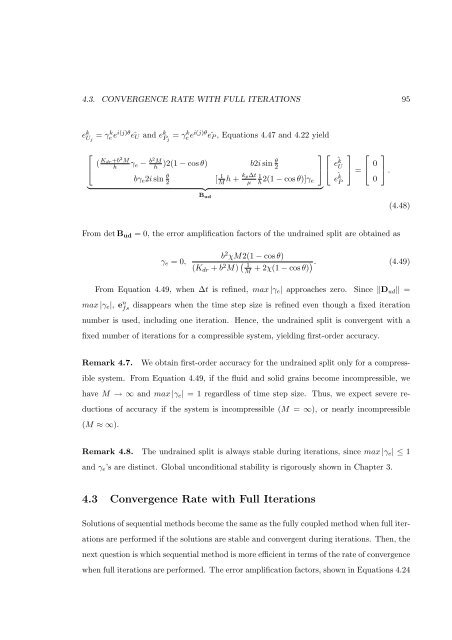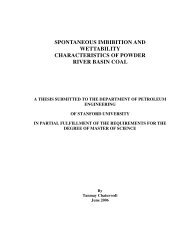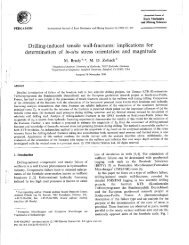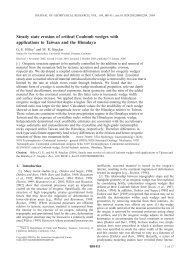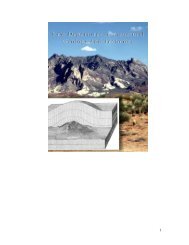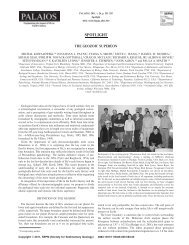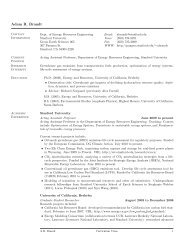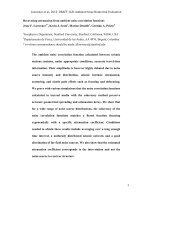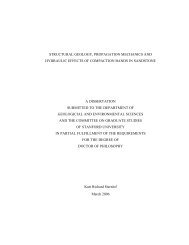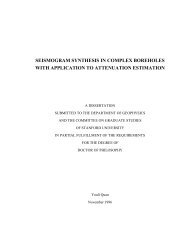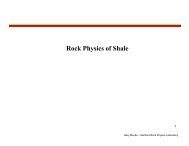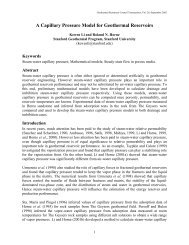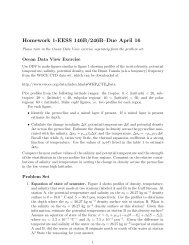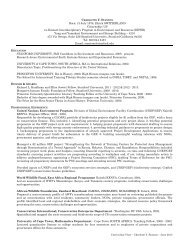- Page 1 and 2:
SEQUENTIAL METHODS FOR COUPLED GEOM
- Page 3:
I certify that I have read this dis
- Page 6 and 7:
splits, are, at best, conditionally
- Page 8 and 9:
deeply. There was deep discussion o
- Page 10 and 11:
3 Stability of the Drained and Undr
- Page 12 and 13:
6.2.3 Undrained split . . . . . . .
- Page 14 and 15:
xiv
- Page 16 and 17:
xvi
- Page 18 and 19:
3.7 Left: the Terzaghi problem in 1
- Page 20 and 21:
4.1 The distribution of the error a
- Page 22 and 23:
5.3 Case 5.2 (1D injection-producti
- Page 24 and 25:
5.18 Pressure history at the observ
- Page 26 and 27:
xxvi
- Page 28 and 29:
2 CHAPTER 1. INTRODUCTION Reservoir
- Page 30 and 31:
4 CHAPTER 1. INTRODUCTION problem (
- Page 32 and 33:
6 CHAPTER 1. INTRODUCTION undrained
- Page 34 and 35:
8 CHAPTER 1. INTRODUCTION where A c
- Page 36 and 37:
10 CHAPTER 1. INTRODUCTION Even whe
- Page 38 and 39:
12 CHAPTER 1. INTRODUCTION
- Page 40 and 41:
14 CHAPTER 2. FORMULATION full form
- Page 42 and 43:
16 CHAPTER 2. FORMULATION dE dt =
- Page 44 and 45:
18 CHAPTER 2. FORMULATION where the
- Page 46 and 47:
20 CHAPTER 2. FORMULATION coupling
- Page 48 and 49:
22 CHAPTER 2. FORMULATION where Div
- Page 50 and 51:
24 CHAPTER 2. FORMULATION between g
- Page 52 and 53:
26 CHAPTER 2. FORMULATION
- Page 54 and 55:
28 CHAPTER 3. STABILITY OF THE DRAI
- Page 56 and 57:
30 CHAPTER 3. STABILITY OF THE DRAI
- Page 58 and 59:
32 CHAPTER 3. STABILITY OF THE DRAI
- Page 60 and 61:
34 CHAPTER 3. STABILITY OF THE DRAI
- Page 62 and 63:
36 CHAPTER 3. STABILITY OF THE DRAI
- Page 64 and 65:
38 CHAPTER 3. STABILITY OF THE DRAI
- Page 66 and 67:
40 CHAPTER 3. STABILITY OF THE DRAI
- Page 68 and 69:
42 CHAPTER 3. STABILITY OF THE DRAI
- Page 70 and 71: 44 CHAPTER 3. STABILITY OF THE DRAI
- Page 72 and 73: 46 CHAPTER 3. STABILITY OF THE DRAI
- Page 74 and 75: 48 CHAPTER 3. STABILITY OF THE DRAI
- Page 76 and 77: 50 CHAPTER 3. STABILITY OF THE DRAI
- Page 78 and 79: 52 CHAPTER 3. STABILITY OF THE DRAI
- Page 80 and 81: 54 CHAPTER 3. STABILITY OF THE DRAI
- Page 82 and 83: 56 CHAPTER 3. STABILITY OF THE DRAI
- Page 84 and 85: 58 CHAPTER 3. STABILITY OF THE DRAI
- Page 86 and 87: 60 CHAPTER 3. STABILITY OF THE DRAI
- Page 88 and 89: 62 CHAPTER 3. STABILITY OF THE DRAI
- Page 90 and 91: 64 CHAPTER 3. STABILITY OF THE DRAI
- Page 92 and 93: 66 CHAPTER 3. STABILITY OF THE DRAI
- Page 94 and 95: 68 CHAPTER 3. STABILITY OF THE DRAI
- Page 96 and 97: 70 CHAPTER 3. STABILITY OF THE DRAI
- Page 98 and 99: 72 CHAPTER 3. STABILITY OF THE DRAI
- Page 100 and 101: 74 CHAPTER 3. STABILITY OF THE DRAI
- Page 102 and 103: 76 CHAPTER 3. STABILITY OF THE DRAI
- Page 104 and 105: 78 CHAPTER 3. STABILITY OF THE DRAI
- Page 106 and 107: 80 CHAPTER 3. STABILITY OF THE DRAI
- Page 108 and 109: 82 CHAPTER 4. CONVERGENCE OF THE DR
- Page 110 and 111: 84 CHAPTER 4. CONVERGENCE OF THE DR
- Page 112 and 113: 86 CHAPTER 4. CONVERGENCE OF THE DR
- Page 114 and 115: 88 CHAPTER 4. CONVERGENCE OF THE DR
- Page 116 and 117: 90 CHAPTER 4. CONVERGENCE OF THE DR
- Page 118 and 119: 92 CHAPTER 4. CONVERGENCE OF THE DR
- Page 122 and 123: 96 CHAPTER 4. CONVERGENCE OF THE DR
- Page 124 and 125: 98 CHAPTER 4. CONVERGENCE OF THE DR
- Page 126 and 127: 100 CHAPTER 4. CONVERGENCE OF THE D
- Page 128 and 129: 102 CHAPTER 4. CONVERGENCE OF THE D
- Page 130 and 131: 104 CHAPTER 4. CONVERGENCE OF THE D
- Page 132 and 133: 106 CHAPTER 4. CONVERGENCE OF THE D
- Page 134 and 135: 108 CHAPTER 4. CONVERGENCE OF THE D
- Page 136 and 137: 110 CHAPTER 4. CONVERGENCE OF THE D
- Page 138 and 139: 112 CHAPTER 4. CONVERGENCE OF THE D
- Page 140 and 141: 114 CHAPTER 4. CONVERGENCE OF THE D
- Page 142 and 143: 116 CHAPTER 4. CONVERGENCE OF THE D
- Page 144 and 145: 118 CHAPTER 5. FIXED-STRAIN AND FIX
- Page 146 and 147: 120 CHAPTER 5. FIXED-STRAIN AND FIX
- Page 148 and 149: 122 CHAPTER 5. FIXED-STRAIN AND FIX
- Page 150 and 151: 124 CHAPTER 5. FIXED-STRAIN AND FIX
- Page 152 and 153: 126 CHAPTER 5. FIXED-STRAIN AND FIX
- Page 154 and 155: 128 CHAPTER 5. FIXED-STRAIN AND FIX
- Page 156 and 157: 130 CHAPTER 5. FIXED-STRAIN AND FIX
- Page 158 and 159: 132 CHAPTER 5. FIXED-STRAIN AND FIX
- Page 160 and 161: 134 CHAPTER 5. FIXED-STRAIN AND FIX
- Page 162 and 163: 136 CHAPTER 5. FIXED-STRAIN AND FIX
- Page 164 and 165: 138 CHAPTER 5. FIXED-STRAIN AND FIX
- Page 166 and 167: 140 CHAPTER 5. FIXED-STRAIN AND FIX
- Page 168 and 169: 142 CHAPTER 5. FIXED-STRAIN AND FIX
- Page 170 and 171:
144 CHAPTER 5. FIXED-STRAIN AND FIX
- Page 172 and 173:
146 CHAPTER 5. FIXED-STRAIN AND FIX
- Page 174 and 175:
148 CHAPTER 5. FIXED-STRAIN AND FIX
- Page 176 and 177:
150 CHAPTER 5. FIXED-STRAIN AND FIX
- Page 178 and 179:
152 CHAPTER 5. FIXED-STRAIN AND FIX
- Page 180 and 181:
154 CHAPTER 5. FIXED-STRAIN AND FIX
- Page 182 and 183:
156 CHAPTER 5. FIXED-STRAIN AND FIX
- Page 184 and 185:
158 CHAPTER 5. FIXED-STRAIN AND FIX
- Page 186 and 187:
160 CHAPTER 5. FIXED-STRAIN AND FIX
- Page 188 and 189:
162 CHAPTER 5. FIXED-STRAIN AND FIX
- Page 190 and 191:
164 CHAPTER 6. COUPLED MULTIPHASE F
- Page 192 and 193:
166 CHAPTER 6. COUPLED MULTIPHASE F
- Page 194 and 195:
168 CHAPTER 6. COUPLED MULTIPHASE F
- Page 196 and 197:
170 CHAPTER 6. COUPLED MULTIPHASE F
- Page 198 and 199:
172 CHAPTER 6. COUPLED MULTIPHASE F
- Page 200 and 201:
174 CHAPTER 6. COUPLED MULTIPHASE F
- Page 202 and 203:
176 CHAPTER 6. COUPLED MULTIPHASE F
- Page 204 and 205:
178 CHAPTER 6. COUPLED MULTIPHASE F
- Page 206 and 207:
180 CHAPTER 6. COUPLED MULTIPHASE F
- Page 208 and 209:
182 CHAPTER 6. COUPLED MULTIPHASE F
- Page 210 and 211:
184 CHAPTER 6. COUPLED MULTIPHASE F
- Page 212 and 213:
186 CHAPTER 6. COUPLED MULTIPHASE F
- Page 214 and 215:
188 CHAPTER 6. COUPLED MULTIPHASE F
- Page 216 and 217:
190 CHAPTER 6. COUPLED MULTIPHASE F
- Page 218 and 219:
192 CHAPTER 6. COUPLED MULTIPHASE F
- Page 220 and 221:
194 CHAPTER 6. COUPLED MULTIPHASE F
- Page 222 and 223:
196 CHAPTER 6. COUPLED MULTIPHASE F
- Page 224 and 225:
198 CHAPTER 6. COUPLED MULTIPHASE F
- Page 226 and 227:
200 CHAPTER 6. COUPLED MULTIPHASE F
- Page 228 and 229:
202 CHAPTER 6. COUPLED MULTIPHASE F
- Page 230 and 231:
204 CHAPTER 6. COUPLED MULTIPHASE F
- Page 232 and 233:
206 CHAPTER 6. COUPLED MULTIPHASE F
- Page 234 and 235:
208 CHAPTER 7. CONCLUSIONS 7.2 Coup
- Page 236 and 237:
210 CHAPTER 7. CONCLUSIONS 7.2.3 Ac
- Page 238 and 239:
212 CHAPTER 7. CONCLUSIONS
- Page 240 and 241:
214 APPENDIX A. STABILITY IN SPACE
- Page 242 and 243:
216 APPENDIX A. STABILITY IN SPACE
- Page 244 and 245:
218 APPENDIX A. STABILITY IN SPACE
- Page 246 and 247:
220 APPENDIX A. STABILITY IN SPACE
- Page 248 and 249:
222 APPENDIX A. STABILITY IN SPACE
- Page 250 and 251:
224 APPENDIX A. STABILITY IN SPACE
- Page 252 and 253:
226 APPENDIX B. MISCELLANEOUS DERIV
- Page 254 and 255:
228 APPENDIX B. MISCELLANEOUS DERIV
- Page 256 and 257:
230 APPENDIX B. MISCELLANEOUS DERIV
- Page 258 and 259:
232 APPENDIX B. MISCELLANEOUS DERIV
- Page 260 and 261:
234 APPENDIX B. MISCELLANEOUS DERIV
- Page 262 and 263:
236 APPENDIX C. CONSTITUTIVE RELATI
- Page 264 and 265:
238 APPENDIX C. CONSTITUTIVE RELATI
- Page 266 and 267:
240 APPENDIX C. CONSTITUTIVE RELATI
- Page 268 and 269:
242 APPENDIX C. CONSTITUTIVE RELATI
- Page 270 and 271:
244 BIBLIOGRAPHY Mech Eng 122: 145-
- Page 272 and 273:
246 BIBLIOGRAPHY Aug. Murad M.A. an
- Page 274:
248 BIBLIOGRAPHY ˇZeniˇsek A. 198


